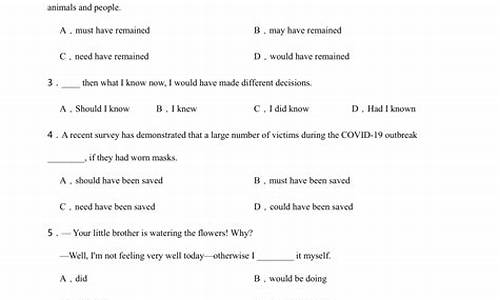您现在的位置是: 首页 > 志愿填报 志愿填报
高考虚拟语气_高考虚拟语气和阅读理解难长句
tamoadmin 2024-05-25 人已围观
简介1.2017年成人高考《英语》语法误用:虚拟语气2.求所有 情态动词 + have done 构成的虚拟语气 (高考范围内)3.高考英语语法:高中英语语法-I drop caps 和虚拟语气4.虚拟语气2020年以后高考考吗5.shall should may might can could must虚拟语气的用法与区别比较《2010年高考英语语法精讲二十八 虚拟语气》由英语我整理,更多请访问:。
1.2017年成人高考《英语》语法误用:虚拟语气
2.求所有 情态动词 + have done 构成的虚拟语气 (高考范围内)
3.高考英语语法:高中英语语法-I drop caps 和虚拟语气
4.虚拟语气2020年以后高考考吗
5.shall should may might can could must虚拟语气的用法与区别比较

《2010年高考英语语法精讲二十八 虚拟语气》由英语我整理,更多请访问:。本内容整理时间为05月12日,如有任何问题请联系我们。
1、If 条件句
If I were you, I would leave now.
If you had asked me yesterday, I could have told you.
If it should rain tomorrow, we couldn?t climb.
NOTICE:错综时间条件句(根据所表示的时间调整)
If you had followed me, you wouldn?t miss the train now.
2、主语从句中的虚拟
①It is (was) important (necessary, strange ) that-clause
It?s necessary that you (should) be present at the meeting.
②It is (was) ordered (suggested, required, requested) that-clause
It was ordered that the room (should) be cleaned.
3、wish + that-clause
①现在的愿望:I wish that you weren?t so lazy.
②过去的愿望:I wish that you hadn?t hurt Jim so much.
③将来的愿望:I wish you wouldn?t talk like that.
--- Have you ever studied French ?
--- No, but I wish I had.
4、表语从句和同位语从句中的虚拟
通常由几个要求接虚拟语气的名词引起:order, demand, suggestion
He gave orders that the test (should) be finished before 5:30.
His suggestion is that the house (should) be built there.
5、宾语从句中的虚拟
下列动词后的宾语从句用虚拟语气:demand, insist, order, require, etc.
The judge ordered that the thief (should) not be punished.
NOTICE: ①suggest ?暗示,表明?
Her expression suggested that he was angry.
②insist ?坚持认为是怎么回事?
The Arab insisted that he had never seen the camel.
He insisted that John (should) do it.
6、状语从句中的虚拟
①as if (though)
与现在相反,从句用过去时
He talks as if he knew everything.
与过去相反,从句用过去完成时
He looks (looked) as if she had wept.
客观事实,从句用陈述句语气
It looks as if you are tired.
②so that, even if (though)
Nothing could have saved him even if he had been tended .
7、由介词短语引起的虚拟语气
①without : Without your help, I shouldn?t get a result.
②but for?若非?: But for you, we couldn?t have carried out the plan.
8、句型
①It?s time + that-clause (指现在或将来)
It?s time that you went to school .( should go to school)
②would rather + that-clause(指现在或将来)
I?d rather you went home now.
Don?t come tomorrow, I?d rather you came next week.
③what if 如果? 怎么办
What if they should come here ?
9、虚拟语气的倒装
Were I you, I would leave now.
Had you asked me yesterday, I could have told you.
Should it rain tomorrow, we couldn?t climb.
《2010年高考英语语法精讲二十八 虚拟语气》由英语我整理,更多请访问: style="font-size: 18px;font-weight: bold;border-left: 4px solid #a10d00;margin: 10px 0px 15px 0px;padding: 10px 0 10px 20px;background: #f1dada;">2017年成人高考《英语》语法误用:虚拟语气
It is high time that:现在是……的时候了,是时候……
虚拟语气了解一下,高考和FCE的重难点
这里是虚拟语气的一种应用,在用虚拟语气虚拟现在及将来的情况时,从句谓语用过去式!
且be动词必须用were,比如I were ,the article were 或it were。
总结:①用过去式表示现在和将来!!!(好比主将从现中用现在时表示将来)
②be动词必须用were,无论前面是不是单数!!!
例句:It's high time that the article were published.
发表这篇文章是适时的。
这个例句没有任何问题,真的。看看下面,已经给出的正确答案几十个踩却只有不到十个捧,我都看不下去了。百度上都有,“虚拟语气”,详细请自行查询,不要让你的无知阻断他人探寻的道路。
求所有 情态动词 + have done 构成的虚拟语气 (高考范围内)
1、中文:我要是你,我不会那么做。
(误)I shouldn"t do that if I was you.
(正)I shouldn"t do that if I were you.(表示与现在事实相反的虚拟语气不能用was,只能用were.)
2、中文:要是我父亲现在在这里,他会告诉我该做什么。
(误)If my father were here now,he will tell me what to do.
(正)If my father were here now,he would tell me what to do.(表示与现在事实相反的虚拟语气中,主句的助动词只能用would,might等过去时。)[环球网校成人高考频道整理虚拟语气误用]
3、中文:要是我知道她的电话号码,我就会给她打电话了。
(误)If I knew her telephone number,I would have called her.
(正)If I had known her telephone number,I would have called her.(表示与过去事实相反的虚拟语气中,条件从句的动词要用过去完成时。)
4、中文:要是昨天没下雨她也许会来。
(误)If it had not rained yesterday,he might come.
(正)If it had not rained yesterday,he might have come.(表示与过去事实相反的虚拟语气中,主句的动词要用助动词的过去时might,could等+HAVE+过去分词。)
5、中文:我不认为我会失败,但要是我失败了,我会再努力。
(误)I don"t think that I shall fail. But if I failed,I would try again.
(正)I don"t think that I shall fail. But if I should fail,I would try again.(表示与将来事实相反的虚拟语气中,条件从句的动词用should加原形动词。)
高考英语语法:高中英语语法-I drop caps 和虚拟语气
must想必/准是/一定做了某事(否定式是下面的can't/couldn't)
could/can(not)本来能够/过去可能会……;过去不可能/过去没能……
should/ought to ;shouldn't/ought not to本该做某事而实际上未做;本不该做而做了某事
may/might 也许或许已经……一般只用于肯定句和否定句(否定句中表示“可能不”不用于疑问句,用might语气更加不肯定) }have done
needn't做了本来不必去做的事
had better(not)用于时候的建议,有轻微责备的口吻 “要是当时(不)做某事就好了”
would rather表示过去愿意做某事,但未做成
虚拟语气2020年以后高考考吗
《高中英语语法-I drop caps 和虚拟语气》由liuxue86.com我整理。本内容整理时间为05月12日,如有任何问题请联系我们。
I drop caps 和虚拟语气
我们知道,在表示?建议?、?要求?、?命令?或?应当做等意义的动词后面的宾语从句、表语从句和同位语从句中的谓语动词需要用虚拟语气,即用?( should )动词原形?来表示。为了便于记忆,我们可以把这些动词的首字母编成一个短句: I DROP CAPS. 这些常用的动词是: insist 坚持; demand 要求; desire 要求; decide 决定; request 请求; require 需要、要求; order 命令; propose 建议; command 命令; ask 请求; arrange 安排; advise 建议; prefer 宁愿; suggest 建议。现将它们的用法举例如下:
I insisted that he should come with us.
我坚决主张他与我们一起来。
He came to my house and demanded that I should help him.
他来到我家,要求我帮助他。
He desired that you should come at once.
他要求你马上来。
The committee decided that no one should be admitted without a ticket.
委员会决定无票者不得入场。
I requested that he should use his influence on my behalf.
我请求他为我施加他的影响力。
His health requires that he should go to bed early.
他的身体状况需要他早点就寝。
The judge ordered that the prisoner should be remanded.
法官令被告还押候审。
I proposed that we should start early.
我建议(我们)早点动身。
The pirate chief commanded that the prisoners should be shot.
海盗首领下令将俘虏枪杀。
The examination instructions ask that the students should not use a pencil.
考试说明要求学生不得用铅笔。
He advised the doctor should be sent for.
他劝我们派人请医生。
I'd prefer that she should act the young lady.
我倒认为她演那个年青女子好。
Sometimes she would suggest that I should be saving some of the money.
她有时建议我把钱存起来一些。
在这些动词后面的从句中使用虚拟语气时应注意如下几点:
( 1 )这些动词变为被动语态(如: It is suggested + that 主语从句)形式后,从句的谓语动词仍用?( should )动词原形?。例如:
It was arranged that they should leave the following week.
安排他们下一个星期动身。
It is ordered that the medicine should be sent soon.
根据命令药品必须马上送去。
It is required that you should arrive at 8 a.m.
你必须上午八点到。
It has been desired that the meeting should be postponed till next week.
已经决定会议延期到下个星期开。
It was desired that this should be postponed till next week.
请转告全体工作人员注意本条规章。
( 2 )由这些动词派生的或转换的名词(如: suggestion 建议; decision 决定; demand 要求; requirement 要求、需要)后面的表语从句和同位语从句的谓语动词仍用?( should )动词原形?。例如:
My suggestion is that we should send a few people to help the other groups.
我的建议是我们派几个人去帮助别的小组。
Their decision was that John should not share the room with them.
他们的决定是约翰不应和他们分享那个房间。
The demand is that manuscripts should be written on one side only.
按照要求,手稿要单面写。
( 3 )这些动词在不表达?某事必须做或某事重要?这一词义时(如: suggest 暗示、表明; insist 坚决认为),后面的宾语从句则不用虚拟语气,而用陈述语气。比较下面两组句子:
① He insisted that the should attend the meeting.
他坚决 要求 出席会议。
She insisted that she heard somebody in the house.
她 坚持认为 她听到屋里有人。
② She suggested that they should start early.
她建 议 他们早点离开。
Her smile suggested that she was satisfied.
她的微笑 表明 她很满意。 《高中英语语法-I drop caps 和虚拟语气》由liuxue86.com我整理
shall should may might can could must虚拟语气的用法与区别比较
考。虚拟语气2020年以后高考考。英语中的语气分为陈述语气、祈使语气、虚拟语气、疑问语气和感叹语气五类。虚拟语气是说话者用来表示假设,或难以实现的情况,而非客观存在的事实,所陈述的是一个条件,不一定是事实,甚至完全与事实相反。
情态动词所表达的可能性程度:must/can't ? should/shouldn't ? might/may (not)
另外两个"类情态词的形式:"need/needn't; have to/don't have to
最自然的虚拟状态:由should/would+原型时态(不含时间只含状态)本质上是过去将来时:即,时间固定在过去将来,状态不同:一般、进行、完成、完成进行。
这时"虚拟语气"的产生往往是因为我们要表达"本来应该……"(而现在却还没有……)
(本来可以……,本来能……)
I should go! (… but I'm still here!) (一般)
I should be working now! (进行)
I should have practiced more (than I did)! (完成)
我应该多多练习!(言下之意,现在我练习得不多。)
I shouldn't dream away my time too much! (完成的否定)
(actually I did dream away my time too much!)
It shouldn't have been leaking for such a long time! (完成进行)
I may/might/could have finished! (完成)
一些常见的句型中,就会出现这种虚拟语气,而处于从句之中,should 常常被省略掉
o suggest, advise, propose, recommend, plan;
o demand, order, direct, arrange, command, decide;
o require, request;
o think, expect, believe, insist, suspect.
由于他们的含义中包含"建议,假设,应该"这类的含义,所以,由他们引起的从句中,就会包含有should+原型时态构成的虚拟语气。
这些动词(以及他们的名次形式,分词形式)引起的从句还有其他的变形:
主语从句,表语从句,同位语从句
It's suggested that…
My suggestion is that…
The only suggestion that...
The only suggestion I can give you now is that…
一些形容词引起的表语从句中,也会有同样的情况
important; necessary; essential
It's natural ; strange; incredible that
a pity; a shame; no wonder
由lest, for fear that, in case 引起的从句中多使用should 表达与事实相反1. 与现在相反:使用[过去时]:
I wish I were not here! (一般现在?一般过去)
Suppose we were not here.
He loved me as if I were his own son. (一般现在?一般过去)
Hope I weren't always losing things! (现在进行?过去进行)
If only/If I hadn't been there! (现在完成?过去完成)
What if I hadn't been waiting right here! (现在完成进行?过去完成进行)
常考句型:It's (high) time (that)…; would rather (that)…
这两个从句,只能表达对现在的看法,所以,从句中只有一般过去时。
2. 与过去相反:过去完成时;
How nice it is if I had past the test!
How nice it is if I had slept a little more this morning!
3. 与将来相反?将来的事情没有发生,所以只能推测。
If it rains tomorrow, we'll have to stay one day more.
不过,由于可以用be to表示将来;所以,虚拟语气中经常出现were to;也是CET-4的常考语法点。
虚拟条件句o if 部分,做一个与事实相反的假设(所以只有一般过去和过去完成);
o 主句部分,这是表示基于这个假设的推测,一般使用情态动词would,少数情况下使用could/might/may。
o 注意:两个部分之间,是有逻辑关系,而在两部分的谓语动词时态上,没有必然的联系。
注意,虚拟条件句中的if可以省略,造成were/had提前,产生倒装。 隐含的非真实条件What would you do with 50 thousand dollar?
How could I be happy without you?
除了条件状语从句之外,原因状语从句也会出现虚拟语气。
o 由in order that, so that引起的从句,肯定的时候可以使用may/might; can/could; 否定的时候,多用shouldn't;
o whoever, whatever, no matter what引起的从句中,多用may+
情态动词的基本用法及其区别
最近几年高考试题中常常借助语境来考查情态动词的基本用法及其区别,因此在平时学习时准确理解和掌握情态动词的基本用法十分重要。情态动词的用法复杂多变,在高考试题中,命题者常常利用语境和句子之间意义上的细微差别来考查学生对情态动词的理解和掌握。对于情态动词,除了要求考生能够准确掌握它们的基本用法外,还要充分利用高考试题所设置的语境来分析句子之间所体现的特殊关系。下面就近几年来高考试题中出现的情态动词的考点进行归纳分析,以便同学们复习掌握。
一、用“情态动词+have +done”结构表示对过去动作的推测,高考试题中常用过去时态或过去的时间状语给以暗示。情态动词的这一用法可以用 “对立统一”来概括。
1.当试题的前句和后句在动作和意义上相互补充说明,且整个句意在动作和时间上是一个整体时,我们可用“统一”关系来解决这样的试题。常见的结构有:
must have done:
表示对过去动作的肯定推测,常译作“一定做了……”,只能用于肯定句中。其否定形式为can’t/couldn’t have done?
疑问式为Can/Could...have done?。
could /might have done:表示对过去发生的动作的可能性推测,常译作“可能做了……”。如:
1) My sister met him at the Grand Theater yesterday afternoon, so he
_____ your lecture. ?
A. couldn’t have attended
B. needn’t have attended
C. mustn’t have attended
D. shouldn’t have attended
本题选A。
2) Jack ____ yet, otherwise he would have telephoned me.
A. mustn’t have arrived
B. shouldn’t have arrived
C. can’t have arrived
D. need not have arrived (C)
2.当试题的前后句在动作和意义上构成转折关系时,常借助“but, however, instead”等词来表示过去的动作与客观事实不符,这时我们就可以用“对立”关系来解决这样的试题。这种结构常见的有:
should have done / ought to have done:表示过去本应该做某事而实际上没有做。
should not have done / ought not to have done:表示过去本不应该做某事但事实上却做了。
need have done:表示过去本来有必要去做某事,但事实上没有做。
need not have done:表示过去本来没有必要做某事,但事实上却做了。如:
3) I was really anxious about you. You _____ home without a word.
(NMET2001)
A. mustn’t leave B. shouldn’t have left
C. couldn’t have left D. needn’t leave
“本不应该离家出走却走了”,故本题选B。
4) I told Sally how to get here, but perhaps I _____ for her.
(NMET’94)
A. had to write it out
B. must have written it out
C. should have written it out
D. ought to write it out
由句中的连词but可知前后句之间是对立关系,分析题意可知本题应选C。
二、考查情态动词基本用法之间的比较和辨析。最近几年高考试题中常借助具体的语境来考查考生对那些最常见的情态动词的基本用法的理解和掌握,因此在做这样的试题时应认真分析语境中所含的实际意义,并结合情态动词的基本含义和用法做出正确的选择。
5) —Is John coming by train?
—He should, but he ______ not. He likes driving his car.
A. must B. can C. need D. may
mustn’t 表示“禁止、不准”;cannot 表示“不可能”;need not 表示“不必要”;may not
表示“可能不”。分析语境可知本题应选D。
6) —I hear you’ve got a set of valuable Australian coins. ______ I have a look?
—Yes, certainly.
A. Do B. May C. Shall D. Should
分析语境可知这是在征求对方的许可,may表示“允许、可以”,语气比较委婉? shall常用于第一、三人称作主语的疑问句中,表示征求对方意见和指示,如果此空用shall,则意为“要(我)看一下吗?”,不符合上下文意思。故本题选B。
7) Mr Bush is on time for everything. How ____ it be that he was late for the opening ceremony?
A. can B. should C. may D. must
must be 表示肯定的猜测,只能用于肯定句中,由题意可知本题应选A。
8) —Are you coming to Jeff’s party?
—I’m not sure. I ____ go to the concert instead.
A. must B. would C. should D. might
由题意和下句中的 “I’m not sure”
可知这段对话中存在一种可能性推测,might可以用来表示一种比较委婉的可能性判断,故本题选D。又如: I should have been there, but I _____ not find the time.
A. would B. could C. might D. should
分析题意可知第二个分句表示过去的某种能力;C 项只表示语气上的可能性,与题意不符。故本题选B。
9) Johnny, you ____ play with the knife, you ____ hurt yourself.
A. won’t; can’t B. mustn’t; may
C. shouldn’t; must D. can’t; shouldn’t
mustn’t 表示“不可以;禁止”,分析题意可知第二个空表示某种可能性,故本题选B。
10) —Will you stay for lunch?
—Sorry, ______. My brother is coming to see me.
A. I mustn’t B. I can’t
C. I needn’t D. I won’t
分析题意可知因为“我弟弟要来看我”,所以“不能留下”,因此对别人的邀请或要求应给予礼貌的拒绝。A 项表示“禁止”;C项表示“不必要”;而D项表示“不会”,均不符合题意。故本题选B。又如:
—Could I borrow your dictionary?
—Yes, of course you _____.
A. might B. will C. can D. should (C)
11)—When can I come for the photos? I need them tomorrow afternoon.
—They _____ be ready by 12?00.
A. can B. should C. might D. need
该题考查情态动词should的基本含义,分析句意可知本题应选B。又如:
12) The fire spread through the hotel very quickly but everyone ____ get out.(
A. had to B. would C. could D. was able to
该题考查了could和be able to的区别,二者都可表示过去时间的能力,但如果表示过去成功地做了某事只能使用was / were able to do,故本题选D。
13) —Shall I tell John about it ?
—No, you _____. I’ve told him already.
A. needn’t B. wouldn’t C. mustn’t D. shouldn’t
情态动词shall在试题中表示征询对方意见或请求指示。答句暗示 “没有必要了”,故本题选A









